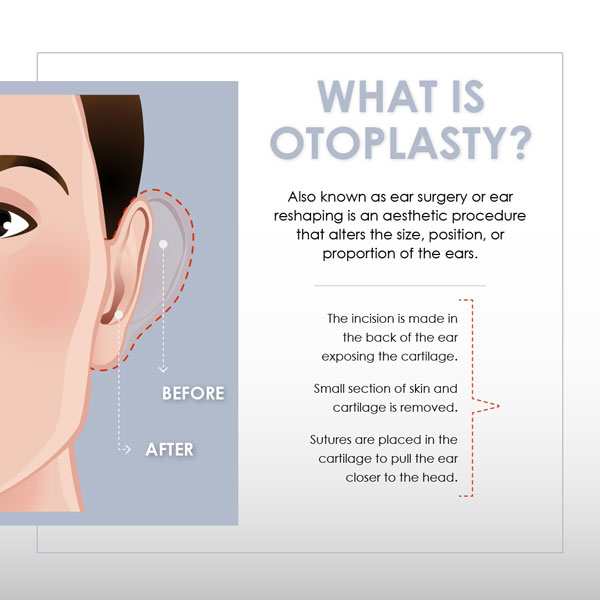The ear is one of the most noticeable facial features and complex structures of the face. Unfortunately, ears that stand out are often the source of teasing and ridicule, particularly among young children. These feelings of self-consciousness and embarrassment can be present in patients of any age and have a devastating effect on their psyche.
Ears usually reach their full growth size between ages 5 or 6 years old, so basically, anyone can be a good candidate for Miami otoplasty. Many surgeons believe that Miami otoplasty should be performed at an early age to avoid or reduce all the teasing. But to figure out the cause of the protrusion, the patient must first undergo a complete physical examination. That’s why a preliminary consultation is so essential.
At Avana Plastic Surgery, our surgeons take the time to tailor this procedure to best suit our patients’ needs so that they can enjoy long-lasting results. This article covers a variety of questions and cosmetic concerns patients may have regarding Miami otoplasty. You will learn about how this cosmetic, reconstructive surgery can improve both the functional and aesthetic appearance of your ears.
What is otoplasty?
Otoplasty, also known as pinnaplasty and ear reshaping, is a cosmetic ear surgery that helps enhance the size, shape, and position of the outer ear. This surgical procedure can correct ear deformities or improve their appearance significantly. Miami otoplasty can be used for cosmetic or reconstructive reasons. One of the most common examples of cosmetic ear surgery is the pinning back of prominent ears while reconstructive ear surgery focuses more on building the outer ear.

WHAT ARE THE BENEFITS OF OTOPLASTY?
Miami otoplasty can provide many benefits to patients with large, protruding ears:
- Corrects some cosmetic issues and treats a variety of deformities such as folded, small, protruding, cupped, and cauliflower ears.
- One of the safest surgeries and patients only receive a mild anesthetic. However, surgeons recommend that children undergo anesthesia before surgery.
- It renews the patient’s self-confidence. Patients that were once ridiculed and discriminated against are no longer targets of cruel bullying. Many clinical studies show that individuals with prominent ears have much lower self-esteem and confidence. Thankfully, Miami otoplasty can correct these issues and help patients regain their confidence level.
- Patients with stretched lobes can benefit from earlobe reconstruction, a quick procedure that aims at restoring the natural appearance of the ear.
- Restore balance to the face as extra skin and cartilage are reshaped and skin is rejuvenated.
Otoplasty Surgery in Miami
Ear surgery is performed under local anesthesia with general or sedative anesthesia if the patient becomes too anxious or is struggling to keep still. The surgeon will proceed and make a small incision behind the ear so that there is minimal scarring. Then part of the cartilage or skin is removed, trimmed, or cut until the desired shape is achieved. There are times, mainly when the ear is forward, that the surgeon will pull the cartilage back rather than trim it, suturing it back to hold the ear in place.
What happens during recovery?
Recovery is generally one of the top concerns most patients have. In most cases, recovery time will be at least six weeks, but you will begin to see significant improvement within 2 to 3 weeks. Your recovery will be outlined during your initial consultation with one of our surgeons. After the surgery is complete, a head dressing is applied to the treated area for 5-7 days to promote healing and keep the shape. Once the dressing has been removed, you may resume your usual activities.
It’s natural to experience discomfort after Miami otoplasty but the pain is very minimal, and it can be treated with pain relievers. During your consultation at Avana Plastic Surgery, your surgeon will discuss the potential risks of this procedure with you. You will also learn of any aftercare procedure for your incision sites. Patients should not remove the bandages until the healing is complete so the new structure is not compromised.
Cosmetic ear surgery will yield permanent results, although the outcomes are based on the types of ear surgery performed. For surgery that corrects protruding ears, the results are seen right away once the bandages are removed, and healing is complete. More complex procedures will be more visible over time as the ears heal and the new position of the ears fully adjusts to the facial structure.
What are the complications of an otoplasty?
Just like any other surgical procedure, ear surgery comes with its risks and complications, including:
- Infection: While it’s very rare, infection is possible in the cartilage and skin of the ear, which can be treated with antibiotics.
- Bleeding: A blood clot or hematoma can be formed under the skin of the ear, and cause severe pain, inflammation, and bleeding of the wound. In such cases, the bandages will be removed so that the lesion and hematoma can be treated.
- Suture complications: Based on the type of suture, whether it is absorbable, monofilament, or braided, removing the stitches may be difficult.
- Recurrence: In some cases, the ears may start sticking out again requiring revision surgery.
- Unsatisfactory appearance: There are times when cosmetic ear surgery doesn’t yield the expected results. For example, there may be asymmetry, which means the ears may not match, may not be positioned close enough to the head, or may have an unnatural contour.
WHAT IS THE COST OF OTOPLASTY IN MIAMI
Since every treatment is tailored to the patient’s specific needs, the fees associated with ear surgery Miami will also vary. The typical otoplasty Miami cost for ear surgery is $2,500-$4,700 with an average cost of $3,550. We also work with leading financial agencies that offer affordable rates to finance your procedure. For a full breakdown of the cost of your treatment, contact us today to schedule a consultation with one of our talented surgeons.
Schedule an otoplasty consultation
During your initial consultation at Avana Plastic Surgery, a surgeon will meet with you to answer your all questions and discuss your concerns. Your ears will be examined, and the causes of the protrusion are explained. You will learn about what happens during the procedure from start to finish so that you can make an informed decision with a clearer understanding of what’s expected from you. Your surgeon will also review several before and after pictures of patients that have undergone ear surgery before.
Otoplasty FAQs
Patients in good health, without a severe illness, may be good candidates for ear surgery Miami. They must set realistic expectations and follow pre-operative and post-operative instructions, especially for cases involving children. That is something to keep in mind for both surgery and recovery.
Your surgeon will make sure you are first cleared for ear surgery Miami. To do this, you will have some lab tests and checkups. Some blood-thinning medications and substances such as aspirin, ibuprofen, salty foods, and alcohol may be discontinued several weeks prior to surgery. Patients will also be instructed to quit smoking before Miami otoplasty.
The procedure takes 30 minutes to an hour with some cases requiring two hours, depending on the type of surgery performed. Then the patient is allowed to go home after the anesthesia has worn off.
The incisions made during Miami otoplasty are discreet since most are made behind the ears. Nobody will be able to notice the scars unless they look closely.
Every patient will heal differently. Recovery generally takes about 7 to 10 days, although some restrictions may apply for several weeks so that your ears are fully protected from trauma. Most patients return to work just a few days after surgery.
Ear surgery is mostly an elective procedure, which means most insurance plans will not cover it. However, when otoplasty is performed to correct a congenital disability, some portions may be included. It’s good you check with your insurance company before surgery to figure out what’s covered.

